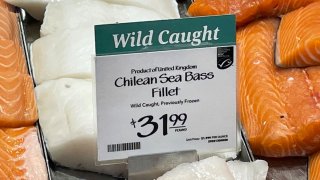
It’s one of the world’s highest-fetching wild-caught fish, sold for $32 a pound at Whole Foods and served up as meaty fillets on the menus of upscale eateries across the U.S.
But Russia’s obstruction of longstanding conservation efforts, resulting in a unilateral rejection of catch limits for the Chilean sea bass in a protected region off the coast of South America, has triggered a fish fight at the bottom of the world, one dividing longtime allies, the U.S. and U.K. governments.
WATCH ANYTIME FOR FREE
Stream NBC10 Boston news for free, 24/7, wherever you are. |
The diplomatic feud, which has not been previously reported, intensified after the U.K. quietly issued licenses this spring to fish for the sea bass off the coast of South Georgia, a remote, uninhabited U.K.-controlled island some 1,400 kilometers east of the Falkland Islands.
As a result, for the first time since governments banded together 40 years ago to protect marine life near the South Pole, deep-sea fishing for the pointy-toothed fish is proceeding this season without any catch limit from the 26-member Commission on the Conservation of Antarctic Marine Living Resources or CCAMLR.
Get updates on what's happening in Boston to your inbox. Sign up for our News Headlines newsletter.
The move essentially transformed overnight one of the world’s best-managed fisheries into a France-sized stretch of outlaw ocean — at least in the eyes of U.S. officials threatening to bar U.K. imports from the area.
“In a world beset by conflict, the U.K. is playing a risky game,” said Will McCallum, head of oceans at Greenpeace U.K. “The history of Antarctic protection is one of peaceful cooperation for the common good of humanity. Russia’s consistent willingness to abuse the process cannot excuse unilateral action by other Members. We trust that countries who have previously imported South Georgia toothfish will not accept the catch of what is now an unregulated fishery.”
For decades, the fishery near South Georgia was a poster child for international fisheries cooperation, one that brought together sometimes adversarial powers like Russia, China and the U.S. to protect the chilly, crystal blue southern ocean from the sort of fishing free-for-all seen on the high seas.
U.S. & World
Last year, as tensions with the West were rising over Ukraine, Russia took the unprecedented step of rejecting the toothfish catch limits proposed by CCAMLR scientists. The move was tantamount to a unilateral veto because of rules, common to many international fisheries pacts, that require all decisions to be made by unanimous agreement.
But critics say the U.K.’s response — issuing licenses without a CCAMLR-approved catch limit — is unlawful under the commission’s rules and weakens the Antarctica Treaty established during the Cold War to set aside the continent as a scientific preserve. U.S. officials have also privately told their U.K. counterparts that they would likely bar imports of any toothfish caught near South Georgia, according to correspondence between U.S. fisheries managers and members of Congress seen by The Associated Press.
The fight underscores how Russia’s attempts to undermine the West have extended to even obscure forums normally removed from geopolitical tussles. It also risks reviving Britain’s tensions with Argentina, which invaded South Georgia in 1982 as part of its war with the U.K. over the Falkland Islands.
But the outcome couldn’t be more consequential: With fish stocks across the globe declining due to overfishing, consumers are demanding greater transparency about where the filets on their plates are sourced. Central to that effort is rules-based international fisheries management on the open ocean and environmentally sensitive areas like the polar regions.

“It sets a dangerous precedent,” said Evan Bloom, who for 15 years, until his retirement from the State Department in 2020, led the U.S. delegation to CCAMLR.
“What the Russians did clearly violates the spirit of science-based fisheries management,” added Bloom, who is now an expert on polar issues at the Wilson Center in Washington. “But that doesn’t necessarily mean that the U.K. can act unilaterally.”
Three of the four vessels authorized by the U.K. to fish near South Georgia starting May 1 belong to Argos Froyanes, a British-Norwegian company that pioneered techniques credited with dramatically reducing seabird mortality in the south Atlantic.
One of its customers is New York-based Mark Foods, the largest U.S. supplier of sea bass certified by the Marine Stewardship Council, the industry’s gold standard for sustainability.
CEO Barry Markman declined an interview request but said his company would not import any product deemed illegal by U.S. authorities.
“We have been working collaboratively with U.S. officials to resolve this situation in a favorable manner,” he wrote in an e-mail.
Chilean seabass — the commercial name of Patagonia toothfish — from South Georgia is sold at both Whole Foods and Orlando-based Darden Restaurants, which operates the fine-dining chains Eddie V’s and The Capital Grille. Neither company responded to a request for comment.
An official from the government of South Georgia and the South Sandwich Islands, which issued the licenses in coordination with the U.K. foreign office, said it took action so as not to give in to obstructionist tactics by Russia that it doesn’t expect will end anytime soon.
The fishery is one of the best managed in the world, with catch limits set by South Georgia below even the quota recommended by CCAMLR. In addition, all vessels authorized to fish near the island have observers and tamper-proof electronic monitoring equipment on board.
Officials say that closing the fishery would’ve taken valuable resources away from research and monitoring because about 70% of the island chain’s budget comes from the sale of licenses.
They point out that the population of toothfish — a bottom-dwelling species capable of living up to 50 years — almost collapsed in the 1990s from poachers drawn to the high prices paid for the bottom-dwelling fish, which can weigh over 200 pounds. However, thanks in part to the multinational efforts of CCAMLR, the species has bounced back.
“The solution isn’t ideal but it is in the best interest of the fishery,” according to the official who declined to be identified by name.
This story was supported by funding from the Walton Family Foundation. The AP is solely responsible for all content.



